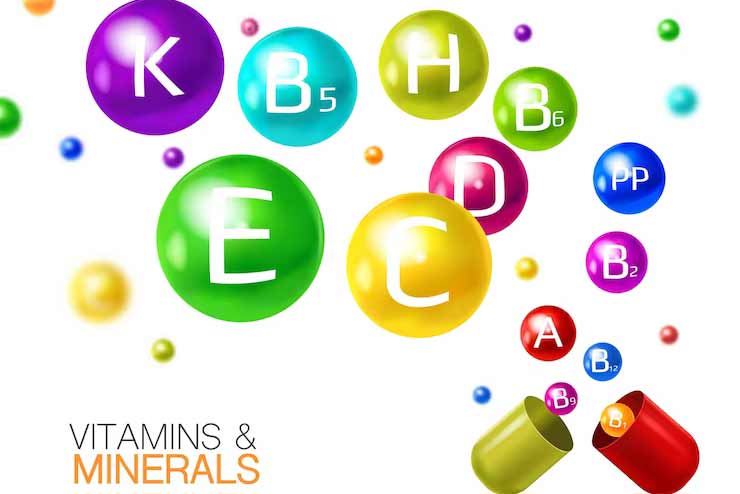Vitamins are a vitamin in food group of essential organic compounds that are required in small amounts to maintain proper physiological functioning of the body. They are one of the main micronutrients that are essential for our health and well-being. Vitamins are not produced by our bodies, which means they must be obtained through our diet or supplements.
These compounds play crucial roles in numerous physiological processes such as the immune system, growth, development, and maintenance of the body. In this article, we will discuss the importance, sources, functions, and deficiency symptoms of different vitamins.
Classification of Vitamins
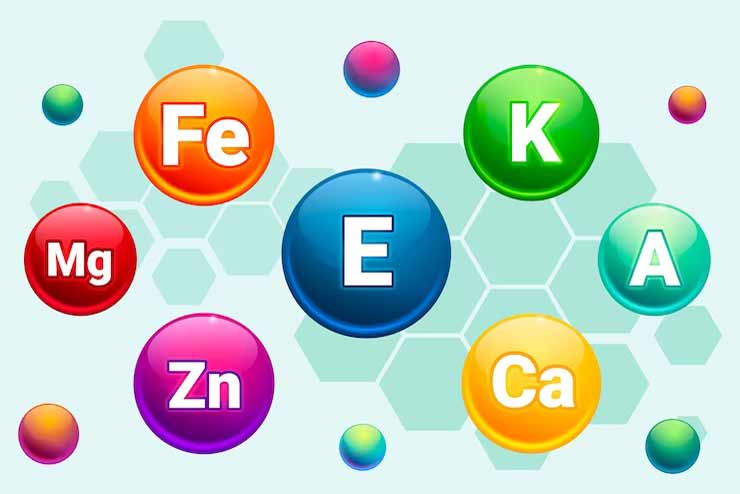
There are two main categories of vitamins, water-soluble and fat-soluble vitamins. Water-soluble vitamins are not stored in the body and need to be consumed daily to avoid deficiencies, while fat-soluble vitamins can be stored in the body and can accumulate over time.
Water-Soluble Vitamins
- Vitamin B1 (Thiamin): Thiamin is important for the metabolism of carbohydrates, amino acids, and the production of energy. It also plays a vital role in the nervous system. It is commonly found in whole grains, pork, and legumes. Deficiency symptoms include fatigue, muscle weakness, and nerve damage.
- Vitamin B2 (Riboflavin): Riboflavin is necessary for the production of red blood cells and maintaining healthy skin, eyes, and mucous membranes. It is commonly found in dairy products, liver, and green vegetables. Deficiency symptoms include anemia, skin disorders, and eye problems.
- Vitamin B3 (Niacin): Niacin is involved in the metabolism of fats, carbohydrates, and proteins. It is commonly found in meat, fish, and whole grains. Deficiency symptoms include fatigue, indigestion, and skin disorders.
- Vitamin B5 (Pantothenic acid): Pantothenic acid is involved in the production of hormones and the metabolism of fats, proteins, and carbohydrates. It is commonly found in eggs, meat, and whole grains. Deficiency symptoms are rare, but they can include fatigue, depression, and irritability.
- Vitamin B6 (Pyridoxine): Pyridoxine is involved in the metabolism of amino acids and the production of neurotransmitters. It is commonly found in meat, fish, and whole grains. Deficiency symptoms include anemia, depression, and confusion.
- Vitamin B7 (Biotin): Biotin is involved in the metabolism of carbohydrates, fats, and amino acids. It is commonly found in egg yolks, liver, and whole grains. Deficiency symptoms include skin disorders, hair loss, and fatigue.
- Vitamin B9 (Folic acid): Folic acid is important for the production of red blood cells, the development of the nervous system, and the synthesis of DNA. It is commonly found in leafy green vegetables, legumes, and whole grains. Deficiency symptoms include anemia, birth defects, and fatigue.
- Vitamin B12 (Cobalamin): Cobalamin is important for the production of red blood cells, the nervous system, and the metabolism of amino acids and fatty acids. It is commonly found in animal products, such as meat, fish, and dairy. Deficiency symptoms include anemia, neurological disorders, and fatigue.
Fat-Soluble Vitamins
- Vitamin A: Vitamin A is important for vision, skin health, and immune function. It is commonly found in animal products, such as liver, fish, and egg yolks, as well as in orange and dark green vegetables. Deficiency symptoms include vision problems, dry skin, and weakened immunity.
- Vitamin D: Vitamin D is important for bone health and immune function.
It is commonly found in fatty fish, egg yolks, and fortified foods. Our skin can also produce vitamin D when exposed to sunlight.
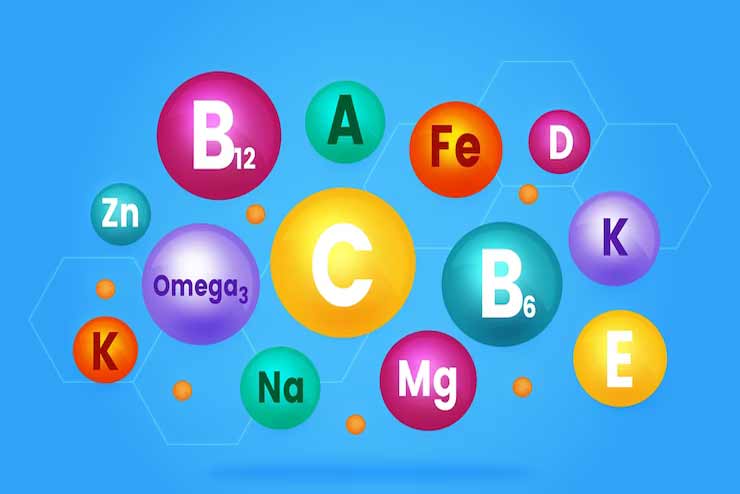
Deficiency symptoms include weak bones, muscle weakness, and increased risk of infections.
- Vitamin E: Vitamin E is a powerful antioxidant that helps to protect the body from damage caused by free radicals. It is important for the health of the skin, eyes, and immune system. It is commonly found in nuts, seeds, and vegetable oils. Deficiency symptoms are rare, but they can include muscle weakness and vision problems.
- Vitamin K: Vitamin K is important for blood clotting and bone health. It is commonly found in leafy green vegetables, such as kale and spinach, as well as in some animal products. Deficiency symptoms include excessive bleeding and weak bones.
Importance of Vitamins
Vitamins play an essential role in maintaining the proper functioning of the body. They are required for numerous physiological processes, including the metabolism of macronutrients, the production of energy, the development and maintenance of tissues, and the functioning of the immune system. Each vitamin has specific functions and plays a unique role in the body.
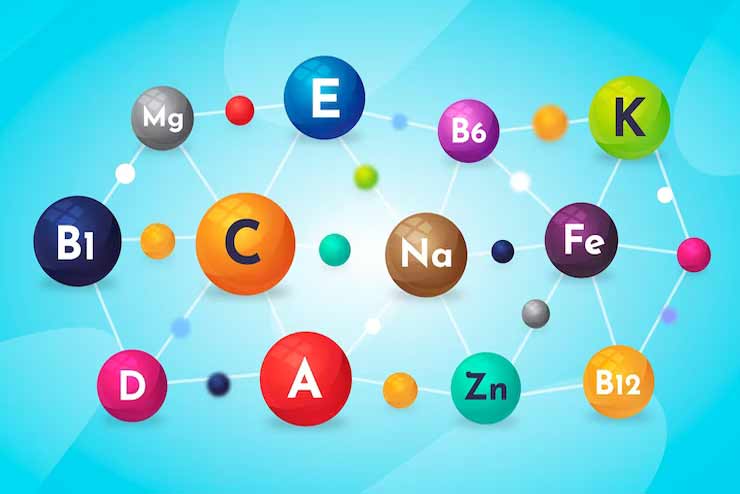
For example, vitamin A is important for vision, while vitamin C is essential for the immune system. Vitamin D is crucial for the absorption of calcium and the health of bones, while vitamin E is a powerful antioxidant that helps to protect cells from damage. Vitamin K is important for blood clotting and bone health.
Deficiencies in vitamins can lead to numerous health problems, ranging from mild to severe. For example, a deficiency in vitamin A can lead to night blindness and dry skin, while a deficiency in vitamin C can result in scurvy, a condition characterized by fatigue, weakness, and bleeding gums.
Sources of Vitamins
The best way to obtain vitamins is through a balanced and varied diet. There are numerous food sources of vitamins, including fruits, vegetables, whole grains, dairy products, and meat. Each vitamin has specific food sources, and it is important to consume a variety of foods to ensure an adequate intake of all vitamins.
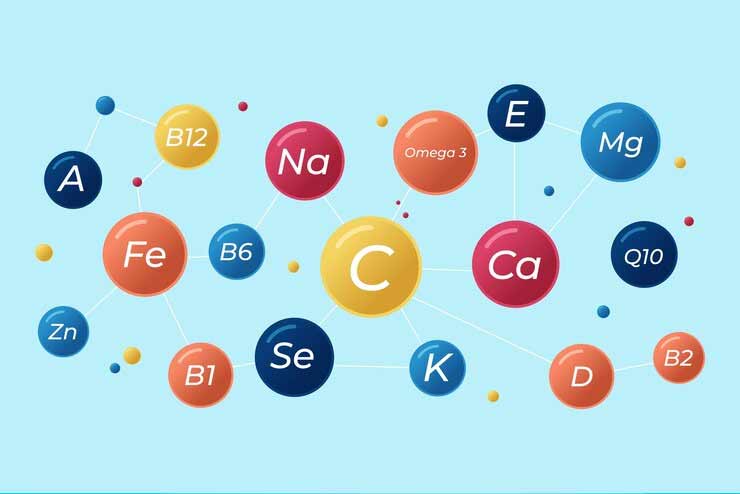
For example, vitamin C is found in citrus fruits, berries, and tomatoes, while vitamin D is found in fatty fish, egg yolks, and fortified foods. Vitamin E is found in nuts, seeds, and vegetable oils, while vitamin K is found in leafy green vegetables, such as kale and spinach.
Supplements are also available for those who may not be able to obtain all of their required vitamins through their diet alone. However, it is important to consult with a healthcare professional before taking any vitamin supplements.
Deficiency Symptoms of Vitamins
Deficiencies in vitamins can lead to numerous health problems. The symptoms of vitamin deficiencies can vary depending on the vitamin and the severity of the deficiency.
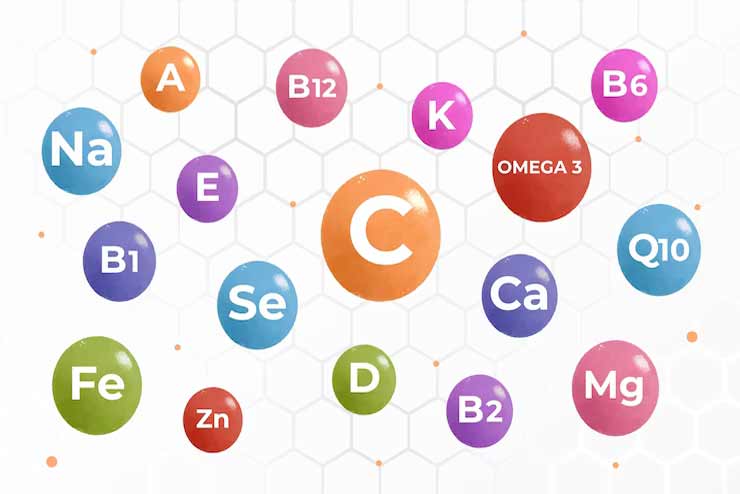
Here are some of the common deficiency symptoms of vitamins:
Vitamin A Deficiency
- Night blindness
- Dry skin
- Weakened immunity
Vitamin B1 Deficiency
- Fatigue
- Muscle weakness
- Nerve damage
Vitamin B2 Deficiency
- Anemia
- Skin disorders
- Eye problems
Vitamin B3 Deficiency
- Fatigue
- Indigestion
- Skin disorders
Vitamin B6 Deficiency
- Anemia
- Depression
- Confusion
Vitamin B9 Deficiency
- Anemia
- Birth defects
- Fatigue
Vitamin B12 Deficiency
- Anemia
- Neurological disorders
- Fatigue
Vitamin C Deficiency
- Scurvy
- Weak immunity
- Fatigue
Vitamin D Deficiency
- Weak bones
- Muscle weakness
- Increased risk of infections
Vitamin E Deficiency
- Muscle weakness
- Vision problems
- Increased risk of infections
Vitamin K Deficiency
- Excessive bleeding
- Weak bones
It is important to note that vitamin deficiencies can have serious consequences, especially in certain populations, such as pregnant women and young children. Therefore, it is important to maintain a balanced and varied diet that includes a variety of nutrient-rich foods.

To ensure that you are getting enough vitamins in your diet, it is recommended that you eat a variety of foods from all the food groups, including fruits, vegetables, whole grains, dairy products, and protein-rich foods. If you are unable to obtain all of your required vitamins through your diet alone, you may need to consider taking a vitamin supplement under the guidance of a healthcare professional.
Conclusion
Vitamins are essential micronutrients that play an important role in maintaining the proper functioning of the body. Each vitamin has specific functions and plays a unique role in the body, and deficiencies in vitamins can lead to numerous health problems.
The best way to obtain vitamins is through a balanced and varied diet that includes a variety of nutrient-rich foods. It is important to consume a variety of foods to ensure an adequate intake of all vitamins. If you are unable to obtain all of your required vitamins through your diet alone, you may need to consider taking a vitamin supplement under the guidance of a healthcare professional.
Maintaining adequate vitamin intake is crucial for overall health and well-being, and a balanced and varied diet is key to ensuring that you are getting all of the vitamins that your body needs. By making healthy food choices and seeking guidance from a healthcare professional, you can ensure that your body is getting all of the vitamins it needs to function properly.
The last word is with you, the audience
Be sure to read other educational articles. For scientific issues, be sure to contact a specialist doctor. These materials are only for study and non-educational purposes. Of course, expert doctors can guide you a lot.
Our cooking training center has collected unique materials for you dear ones. This content is very useful and will help you cook the best and most delicious food for yourself and your loved ones at home.
The recipe section is for introducing the best dishes of the nations. Dear ones, you can see the best dishes in this section and cook whatever you want at home. Don’t forget to read the recipe and ingredients before doing anything to determine your cooking needs.
Soon we will be with you with a more professional team with more facilities. We suggest that if you are overweight, fill out the and wait for our experts to contact you and send you the right meal plan.
The slogan we put on our site is to fight obesity. In this regard, we will provide you with many suitable recipes. Be sure to follow our site to learn about many healthy foods. Do not forget that a healthy life requires extensive changes. One of these changes is changing food. So eat healthy
Please follow us on linkedin. You can learn all best french food recipe and best Italian food recipe and best arabic food recipes and best Iranian food recipes you can check our Reddit page.
